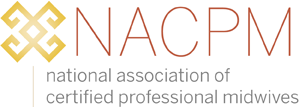Addressing Birth Disparities with Midwifery Care
Thursday, December 13, 2018
Please sign up here if you wish to receive Continuing Education Credits for webinars. Please contact us if you have questions or suggestions for future webinars.
Our presenters, Jill Alliman, DNP, CNM, Program Director of the American Association of Birth Centers (AABC) Strong Start project, and Saraswathi Vedam, Lead Investigator of the Birth Place Lab at University of British Columbia, to hear about exciting new research that demonstrates the critical role midwifery care plays in eliminating racial inequities and disparities in birth care and outcomes.
Part One: Birth Centers provide a Strong Start for Mothers and Babies!
Co-Presented by NACPM and AABC
A new report released by CMS/CMMI states that “Women who received prenatal care in Strong Start Birth Centers had better birth outcomes and lower costs relative to similar Medicaid beneficiaries not enrolled in Strong Start.” Strong Start for Mothers and Newborns Initiative was designed by the Center for Medicare and Medicaid Innovation (CMMI) to determine whether enhanced prenatal care could reduce preterm birth and other poor outcomes. Birth center care was one model studied.
Jill Alliman, DNP, CNM, will present and discuss the outcomes of the birth center group, including birth outcome data for women who received birth center prenatal care. Findings of the national evaluation led by Urban Institute with a risk-matched group of Medicaid recipients in usual care will be summarized. The birth center group showed lower preterm birth, low birth weight, and cesarean birth with disparity reduction for all measures compared to the matched group with similar risk profiles.
The AABC Strong Start evaluation is one of the most important studies of midwifery-led birth center care in recent years. The implications for policy change to increase access to birth center care are tremendous. Come learn about this important study and how to disseminate these findings.
Jill Alliman, DNP, CNM has worked for 32 years as a midwife and advocate to improve access to maternity care for women and families. A birth center midwife in rural Appalachian Tennessee for 26 years, Jill Alliman learned that access to quality maternity care improves maternal-infant health disparities. As Past President of AABC and Chair of Government Affairs Committee, Jill lobbied to pass the Birth Center Medicaid Bill in 2010 so Medicaid beneficiaries could have access to birth center care. From 2013-2017, she was the Project Director of AABC Strong Start, a grant program measuring the impact of midwifery birth centers on preterm birth rates and other outcomes for Medicaid beneficiaries, collecting data in 45 birth centers with funding from the Center for Medicare and Medicaid Innovation. Data from the 8806 participants in this project show that enhanced prenatal care provided by midwives in birth centers dramatically improves outcomes and reduces maternal and infant health disparities. Jill has been on the faculty at Frontier Nursing University since 2013, where she teaches Master’s and Doctoral APRN and midwifery students about policy issues and collaboration skills impacting their future practice. Jill’s life work has been supporting women and families through pregnancy and childbirth, which has expanded into advocacy, policy, and research to increase access to community birth for people insured by Medicaid.
Please find Strong Start resources including “Findings at a Glance” here and here.
Part Two: How Do Communities of Color Describe Quality and Safety in Birth Care?
In the United States, differences in adverse perinatal outcomes between White women and women of colors are well-documented, and persist even when controlling for socio-economic status and access to quality prenatal care. Some policy makers and public health experts attribute these disparities to concomitant disparities in wages, housing, and safe environments. However, researchers have proposed that institutional racism and poor access to community-based, culturally congruent models of care contribute to adverse outcomes. Accordingly, new global standards (WHO) highlight the critical impact of patient-provider communication, emotional support, and respectful care on quality and safety for mothers and newborns. Three different Lancet series (on midwifery, maternal health, and effective use of cesarean), and the AIM Mapping study suggest that scaling up midwifery is the answer.
However, research on how communities of color experience maternity care in North America is scarce. In the Giving Voice to Mothers-US study, community members worked with clinicians, NGO leaders, and researchers to design a study on quality of maternity care as experienced by pregnant persons of color (African American, Native American, and Latina), and those who planned to give birth in homes and birth centers. Together they developed and administered a national survey to explore novel topics including: women’s experiences of agency in decision-making, non-consented care, access to supportive services, access to options for care, and systemic respect or discrimination over the course of care.
In this webinar, Professor Vedam will explore what clients say about why place of birth and type of provider matter, and what midwives can do to upscale access to high quality maternity care for all communities.
Saraswathi Vedam, RM, FACNM, MSN, Sci D(hc), is Lead Investigator of the Birth Place Lab at University of British Columbia. Over 35 years, she has been a midwife, educator, and researcher. Her scholarly work includes provincial, community-based participatory studies, Changing Childbirth in BC and the Giving Voice to Mothers Studies, exploring experiences of maternity care across diverse communities in North America. These projects led to the development of 3 new person-centered quality measures. She also led a multidisciplinary team for the Access and Integration Maternity care Mapping (AIMM) Study linking integration of midwives to improved maternal-newborn outcomes in the US. Currently she is PI of a 5-year CIHR funded national study of respectful maternity care across Canada. Professor Vedam has been active in setting international policy on place of birth and interprofessional collaboration, providing expert consultations to ministries and Health Boards in 10 countries. She convened 3 national Home Birth Summits, and chaired the 5th International Normal Labour and Birth Research conference.
